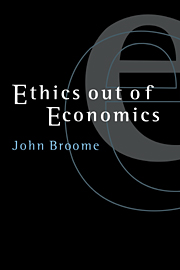2 - ‘Utility’
Published online by Cambridge University Press: 12 November 2009
Summary
Usefulness
‘Utility’, in plain English, means usefulness. In Australia, a ute is a useful vehicle.
Jeremy Bentham specialized the meaning to a particular sort of usefulness. ‘By utility’, he said, ‘is meant that property in any object, whereby it tends to produce benefit, advantage, pleasure, good, or happiness, (all this in the present case comes to the same thing) or (what comes again to the same thing) to prevent the happening of mischief, pain, evil, or unhappiness to the party whose interest is considered.’ The ‘Principle of Utility’ is the principle that actions are to be judged by their usefulness in this sense: their tendency to produce benefit, advantage, pleasure, good, or happiness. When John Stuart Mill speaks of the ‘perfectly just conception of Utility or Happiness, considered as the directive rule of human conduct’, he is using ‘Utility’ as a short name for this principle. ‘The Greatest Happiness Principle’ was another name for it. People who subscribed to this principle came to be known as utilitarians.
Benthamism entered economics in 1873, with the publication of W. S. Jevons's Theory of Political Economy. Jevons quoted Bentham's definition of ‘utility’ and announced: ‘This perfectly expresses the meaning of the term in Economy.’
But after Jevons's time, the meaning of ‘utility’ in economics shifted. The word came to refer not to the tendency of an object to produce good, but to the good an object produces. By a person's ‘utility’, economists came to mean not the person's usefulness in promoting good around her, but her own good. ‘Utility’ came to mean good. This meaning has since been overlaid by yet another, which I shall be describing later. But it still persists as one of the current meanings of ‘utility’.
- Type
- Chapter
- Information
- Ethics out of Economics , pp. 19 - 28Publisher: Cambridge University PressPrint publication year: 1999
- 2
- Cited by



